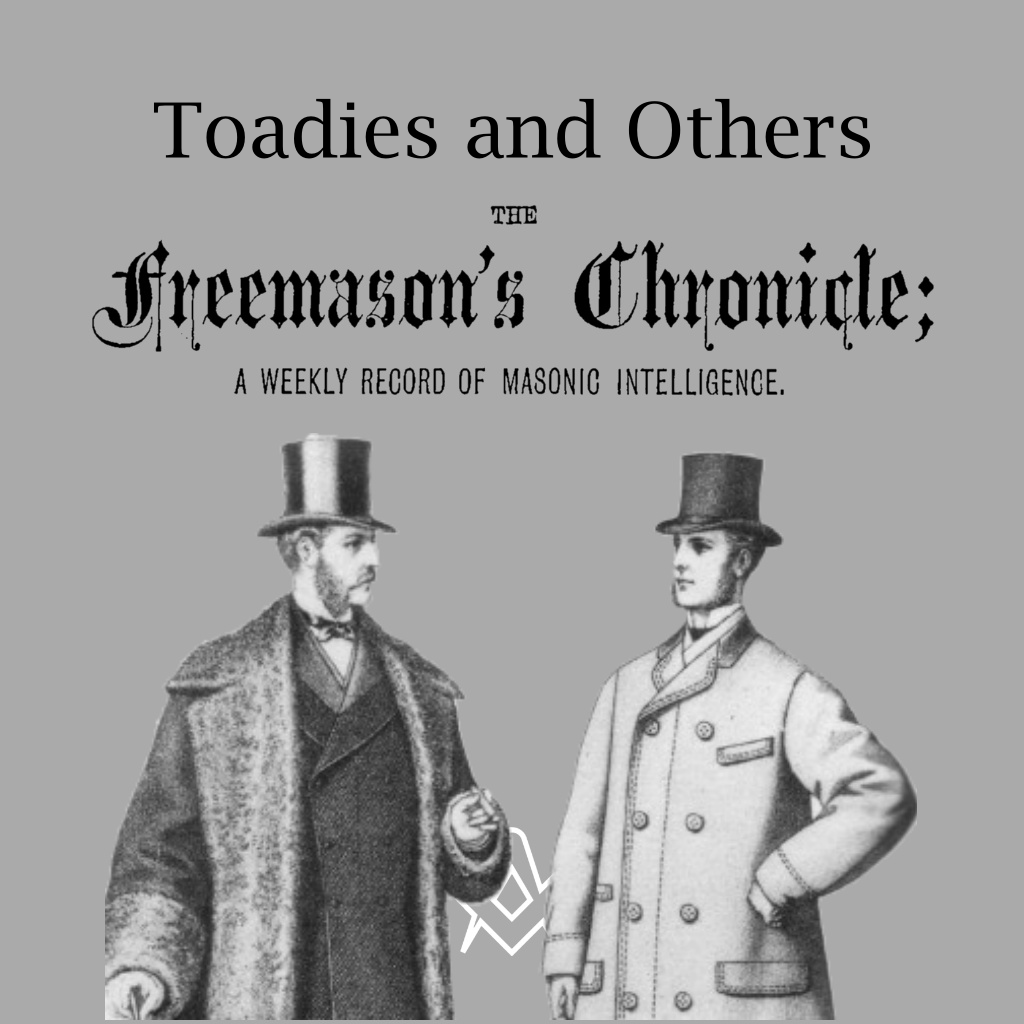In the realm of Masonry, the principles of equality and respect are paramount. Yet, the presence of toadies—those who obsequiously seek favour from the influential—threatens these ideals.
While Masonry embraces diverse beliefs and backgrounds, it rejects the sycophantic behaviours of toadies, flunkeys, and tuft-hunters, urging members to uphold genuine respect and self-worth. The Freemason’s Chronicle – 22nd January 1876
[Toady – a person who behaves obsequiously (too eager to serve or obey) to someone important.]
If Masons act up to the principles they profess, there can be nothing like toadyism among them. Unfortunately, as we remarked in a recent issue, men, when they become Masons, do not always cast aside their un-Masonic weaknesses.
Of course, we give them credit for striving to do so most earnestly, but the uncomfortable fact remains notwithstanding, that the relations between Members of the Craft are not always as Masonic as they should be.
One of the grand governing principles of our Craft is that of equality, by which we do not mean the cant equality of which theorists are prone to write, but that sensible kind of equality which places all men on an equal footing as regards certain conditions.
For instance, men may be unequal as regards rank or wealth, but they maybe equally respectable, their good deeds may shine with the same brilliancy, they may possess pretty nearly the same qualities of heart and mind.
There may, in fact, be equality in certain respects, if not in all. This is well nigh the utmost we can hope for, and it is in this sense that Masonry regards all men as equal.
We do not profess to say that all Masons are on an equal footing in all respects, or that they should be so. That were a proposition, which only an inmate of Bedlam would be likely to laydown.
They are bound, by the same vows, and to observe the same landmarks, but the equality they preach is not carried to an absurd point . At the same time it must be confessed there are too many members who sacrifice voluntarily, and too often for contemptible reasons, a portion of that equality which is their due.
There are some who think it wise to carry respect for rank and ability to an extreme point. There is, perhaps, a magnate in the land who enrols him-self a member of some Lodge.
The majority of the members hail his advent amongst them with infinite pleasure. They consider his enrolment a mark of respect for the principles they profess.
They show him that respect and deference which his status in society would command anywhere. But they do not turn this respect and deference into ridicule by servilely assenting to all his eccentric views and wishes.
They claim the right to differ with him in matters of opinion, and, better still, they exercise this right. There are some, unfortunately, who think and act differently. There are those who fancy that any view propounded by a man of rank is better worth adopting than that laid clown by his inferiors in the social scale.
Goaler is paribus, perhaps, this assumption might not beavery far from the truth. Assuming for a moment a perfect equality amongst the members in mental power, in virtue, in wealth, and therefore, in a certain sense, in the power to do good, there appears to be no doubt that inequality in rank would give a superiority to him who occupies the higher position.
But this, we have said, is not the reason which actuates all minds. The bare fact that this or that view has been adopted by My Lord Tom Noddy, suffices to enlist the sympathies with him of plain, Mr. A. B. C, or X. Y. Z. These never think of inquiring into the justice or injustice of My Lord Tom Noddy’s opinion. It emanates from him. It must be right, and they adopt it accordingly.
These have half a mind, perhaps, at the first, to raise some reasonable objection, but the novelty of supporting the views of some nobleman is too much for them.
They yield with what grace they may, and support, not for peace sake or some such worthy purpose, but for the single desire to ingratiate themselves in the favour of the great man, any proposal to which he may lend his countenance, this is one form, of that toadyism, which exerts so powerful an influence in the world.
Nor is it only the man of quality who has a number of his fellows always ready to accept implicitly his dicta. The man of fashion and the man of wealth find plenty who will readily yield acquiescence in all their views and actions on all occasions, not because they are of the same mind, but merely to ingratiate themselves in the good opinion of their patrons.
It happens, of course, that many of these latter, while readily accepting the homage paid to their superior rank, wisdom, or wealth, have sense enough to analyse and see through the true motives of their followers, and not unfrequently give utterance to a few righteous sarcasms at their expense.
But these have little effect. By long observance of toadyism the followers have gradually come to be insensible to every kind of reproach direct or implied.
They are as slow at perception, as incapable of estimating the real meaning of what is said, as the Scot is pronounced to be in appreciating a joke.
These fulsome adulators of men in high places are a perfect pest to society, and especially in Masonry, where freedom of thought and action, within certain limits, is the lot of every brother.
It is no satisfaction to feel they would, and, in fact, do behave in the same fashion outside the walls of the Lodge.
There is no creed so calculated to excite in us a just respect for others, while we yet retain a proper degree of respect for ourselves, as Masonry, and naturally enough we feel annoyed, nay even ashamed, perhaps, on finding that sundry of those who have joined our ranks have in no wise profited by the healthy teachings of the Craft.
Masonry is capable of embracing, within its fold, men of all religions, and of every shade of politics, but we require them to be free men, and the toady, who is never happy save when currying favour with the patron of his choice, is not a free man, but a contemptible fellow.
Then there is the flunkey, whom we are disposed to set down as a more vulgar, a more pronounced specimen of the genus toady.
The toady is more often a man of refinement, with sense to conceal the weakness he has so success-fully cultivated. Wo do not mean to imply that flunkeys and toadies are severally representative of the same class of men in different grades.
There are flunkeys in every station in life, and there are toadies. But the sycophancy of the latter assumes, we think, a less objectionable form. There is a vulgar meanness about the flunkey, which is less often noticeable in the toady, who, as we have said, has sometimes refinement to conceal the motives of his conduct.
The flunkey often grovels in the dust at the feet of his idol, without the slightest sense of shame. The toady sidles up to him and softly insinuates himself into his good graces.
The one follows like a cur, the other fawns like a spaniel. We do not venture to say there is, in the main, much difference between the two, but the one has seemingly a more respectable exterior.
Another objectionable kind of individual of the same species is the tuft hunter, the man who, whatever his own gifts may be, is never so happy as when courting the favours of the great. Such men will descend to any pettiness in order to win a smile, and a ” Thank you !” from one moving in a higher sphere.
He is ever their ” very humble servant to command,” to everyone who has a handle to his name, or who is commonly reported to have had a grandfather. Such men not unfrequently enact their part very successfully.
Men of good birth were not always men of good sense. They like flattery too, and when they find men of acknowledged parts paying homage to them, they are sometimes weak enough to fancy the tribute of respect is paid not to their rank, but to their virtues.
Hence, they take kindly to the tuft-hunter, and patronise him freely, and often to his advantage. The man who is ready at any moment to fall down and worship any image that may be set up by his patron, in order to subserve his own interests, such a man may do so profitably, perhaps, but he is not one whom we should hold up as an example for any friends of ours to follow.
Masonry has no place for the class of men we have been describing. Deference and respect must be paid to all men who are worthy, but the worship of idols is forbidden. The Craftsman who bows respectfully to authority is to be admired, but not he who does so obsequiously, without the slightest sense of self-respect.
 The Freemasons Chronicle, a weekly record of masonic intelligence, was first published 2nd January 1875 London, England as an independent weekly journal of masonic interest and continued for 27 years.
The Freemasons Chronicle, a weekly record of masonic intelligence, was first published 2nd January 1875 London, England as an independent weekly journal of masonic interest and continued for 27 years.
It should be the business of a journal devoted to the interests of the Order to attempt the removal of prejudices such as these, which, though they may have little perceptible influence upon the prosperity of the Fraternity, yet have the effect of preventing timid or ill-informed persons from enlisting under its banner.
It will not only attempt to keep pace with the growing literary requirements of the day, but it will seek to exhibit the Order to the non-Masonic world divested of its technical details, and clothed in the garb of Charity and Brotherly Love.
The questions of the hour, which exercise the minds of thoughtful men, will be handled freely and broadly, without any tinge of political or sectarian bias.
The memoranda of Masonic gatherings which will appear from week to week, will be full and accurate; and as free interchange of opinion is one of the best signs of life and vigour in any society, ample scope will be given for Correspondence on topics of interest to the Order.
If we may venture upon a new rendering of words which recent events have made memorable, we will say here, once and for all, that we will be keen men of business, and will spare no effort, consistent with honour, to achieve commercial success; but first, and before all things, we will prove to our brethren and the world that we are FREEMASONS.
Recent Articles: The Freemason's Chronicle
 Operative And Speculative Masonry Explore the fascinating transition from Operative to Speculative Masonry in our latest post. Discover historical insights from Augustus C. L. Arnold and Rev. Wm. P. Strickland, shedding light on Freemasonry's evolution and its enduring principles. Dive into the rich history and significant milestones that shaped modern Freemasonry. - The Freemason's Chronicle - 2 September 1876 |
 Discover the true essence of Freemasonry, an ancient order founded on the profound principles of love for God and man. It's a call to rise above mere appearances, to embody genuine virtue and benevolence, transcending societal pretense. Embrace the transformative power of simplicity, and let the authentic glories of Freemasonry inspire your path. |
 Discover the intriguing story of a man who became a Mason but openly professed his dislike for the institution. Unravel the peculiar circumstances that led him down this path and explore the unexpected consequences that followed. Dive into this thought-provoking account that challenges our notions of loyalty and reveals the complexities of human nature within the Masonic fraternity. |
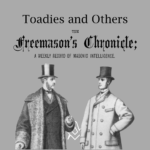 In the realm of Masonry, the principles of equality and respect are paramount. Yet, the presence of toadies—those who obsequiously seek favour from the influential—threatens these ideals. While Masonry embraces diverse beliefs and backgrounds, it rejects the sycophantic behaviours of toadies, flunkeys, and tuft-hunters, urging members to uphold genuine respect and self-worth. The Freemason's Chronicle - 22nd January 1876 |
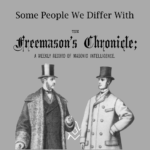 Unveiling the Unpleasant: Some People We Differ With Discover the intriguing dynamics of quarrels within the Masonic brotherhood. From the cantankerous to the litigious, the peevish to the vengeful, delve into the characters that challenge fraternal harmony. Explore their motives, temperaments, and the art of navigating disputes with these fascinating brethren. Brace yourself for a riveting journey into the world of conflicting personalities. |
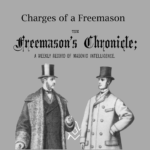 Unravelling the Masonic Mystique: A Deep Dive into the Freemasons' Charges - Explore the intricate world of Freemasonry, its principles, rituals, and the mechanisms for resolving internal disputes. Discover how this ancient fraternity fosters unity, promotes moral conduct, and upholds the sanctity of its secrets, while navigating the complexities of modern society. - The Freemason's Chronicle - 4 December 1875 |
 Unlock the hidden lessons of Masonic Studies! Don't settle for superficial knowledge or mere rituals. Discover the true depth and meaning behind Freemasonry. Expand your understanding of Tracing-Boards, Lectures, and more. Join regular Lodges of Instruction to enhance your Masonic journey. Become a knowledgeable Freemason, not just a token-bearer. Unleash the power of true Masonic wisdom today! |
 Uncover the incredible story of how Masonry saved the life of a Crimean War foot soldier in this historical and masonic account. Through the first hand experience of a soldier engaged in fierce hand-to-hand combat, witness the fateful encounter with a Russian Freemason that changed the course of his life. Learn how brotherhood and a deep dedication to the craft can lead to unforeseen and life-saving circumstances on the battlefield. |
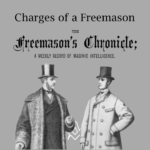 The Freemason's Chronicle - Charges of a Freemason The secrets of Masonry are the exclusive property of the Craft, and can never be communicated to one who is a mere labourer and not an accepted Mason. Hence, no labourer, that is, one who has not been regularly initiated in a legal Lodge. Article first published in The Freemason's Chronicle, 27 November 1875 |
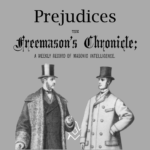 The Freemason's Chronicle - Prejudices Prejudices are partial judgments in favour of, or against certain persons or things, and, for convenience sake, may be ranged in two categories—those which are, comparatively speaking, harmless, and those which are harmful. Article first published in The Freemason's Chronicle, Oct. 2 1875. |
 The Freemason's Chronicle - Cliques Is Freemasonry - a Clique ? Man has been defined as a gregarious animal, but in his highly civilised condition he is gregarious only to a limited extent. First published in The Freemason's Chronicle, Oct. 2 1875, addresses the same challenges then as now. |
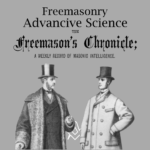 The Freemason's Chronicle - Freemasonry - an Advancive Science Is Freemasonry - an Advancive Science ? Not to confuse advancement with innovation. Has it been the case that Freemasonry's survival for 300 years plus is due to being an Advancive Science, tending to advance. First published in The Freemason's Chronicle 18 September 1875, addresses the same challenges then as now. |
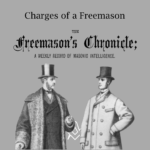 The Freemason's Chronicle - Charges Of A Freemason An interpretation of the "Charges of a Freemason", written Bro. Cornelius Moore and published in 1875, that introduce certain opinions that for some readers, will not sit well in contemporary times. - The Freemason's Chronicle, Sept. 11, 1875 |
 On The Order Of The Temple And Its Doctrine. THE Order of the Temple is divided into two great classes, denominated respectively the Order of the Temple and the Eastern Order. The Eastern Order gave birth to the Order of the Temple, and in the course of time has become an appendage of the latter. It is in ancient Egypt that we find the cradle of the Eastern Order. The Freemason's Chronicle, Sept. 4, 1875 |
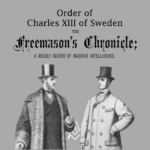 Order of Charles XIII of Sweden The following translation of the Manifesto of King JL Charles XIII of Sweden, on the occasion of his establishing the Masonic Order which bears his name, and of the Statutes of the said Order, may be interesting to our readers. The Freemason's Chronicle, Aug. 28, 1875 |
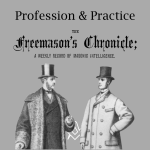 Most of our readers in the course of their experience, have doubtless met with enthusiastic brethren who take it for granted that a Mason can do no wrong. These enthusiasts are thoroughly convinced that the vast majority of those who join the Order are the most benevolent, the most moral, and the very noblest members of society. - The Freemason's Chronicle 10 July 1875 |
 An article investigating the relationship between masonry and citizenship. Are the principles of Freemasonry aligned with the freemason's claim to be a better citizen of the world? The Freemason's Chronicle - 19 June 1875 |
 A visitor must make clear his identity to the satisfaction of the Lodge he proposes to visit. More than once have we been asked to explain our views as to the reception of strangers in a Lodge. - The Freemason's Chronicle - 29 May 1875 |
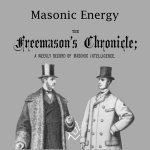 Is there reason in the accusation that Masonic energy looks only to a course of good feeds, when we can point to such grand results as have been achieved in these latter years, both in respect of the extension of our Order ? - 1May 1875 |
 Implementing Freemasonry's peculiar system of morality in our day to day business affairs was the topic of this article, Commercial Integrity, first published in The Freemason's Chronicle - 8 May 1875 |
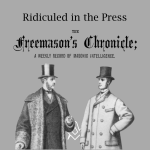 Ridicule has been somewhat illogically described as the test of truth. If it were so, Freemasonry ought to have perished long since. Two press reports from May 1875 covering the |
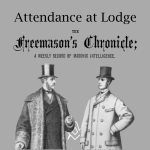 There are many things which Freemasonry will do for a man in the way of opening his mind and giving him larger and kindlier views of life, but Freemasonry itself, cannot eradicate the natural bias of the disposition. |
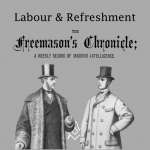 There is, we fear, too marked a tendency in very many Lodges to hasten through its labours, with a view to entering, as soon as possible, upon the business of refreshment. - The Freemason's Chronicle 17th April, 1875 |
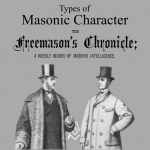 Another example that demonstrates that nothing really changes in Freemasonry. In an article the Types of Masonic Character published 145 years ago in The Freemason's Chronicle 10th April, 1875 |
 A brief history on the relationship between the British Monarchy and the craft - The Freemason's Chronicle 20th March , 1875 |
 What are the qualities of a convivial man and how does this dovetail perfectly in to Freemasonry ? 16th March, 1875 |
 A review of the "Sketch for the History of the Dionysian Artificers," a fragment, by Hyppoli to Joseph Da Costa - This little work may be regarded as, so to speak, the Holy Grail of Masonry. |
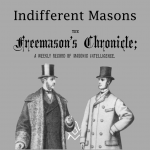 Nothing really changes, an article Indifferent Masons, From Le Monde Maçonnique 1874. Translation published in The Freemason's Chronicle 20th February, 1875 |
 In handling an intruder in the lodge, we endeavoured to show that a good Mason should be a gentleman, and a sincere man. The Freemason's Chronicle 20th February, 1875 |
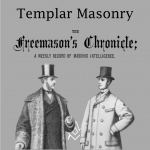 Templar Masonry - a historical aspect of the Religious and Military Order of the Temple published in The Freemason's Chronicle 13th February, 1875 |
 Secrecy perhaps the strongest objection urged by the enemies of the Masonic Order against its existence published in The Freemason's Chronicle 20th March 1875 |
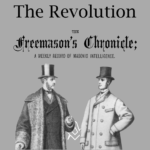 Freemasonry In The United States during And After The Revolution We take a look at Freemasonry in the United States during and after the Revolution first published in The Freemason's Chronicle - February 6, 1875 |
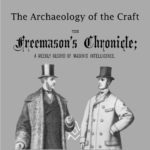 We take a look at the archaeological connection with the Craft, first published in The Freemason's Chronicle - January 30, 1875 |
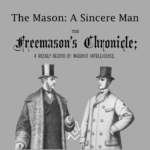 What it means to a Freemason to be a sincere man. Extract: first published in The Freemason's Chronicle - January 23, 1875 |
 What it means to a Freemason to be a citizen of the world ? First published in The Freemason's Chronicle - January 16, 1875 |
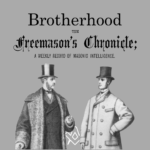 Brotherhood! In that one word what sympathetic associations arise. First published in The Freemason's Chronicle - January 9, 1875 |
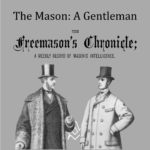 This opening article was written 145 years ago, yet it resonates with Freemasons today as it did then. First published in The Freemason's Chronicle, January 2, 1875, Issue 1 |
masonic knowledge
to be a better citizen of the world
share the square with two brothers

click image to open email app on mobile device



